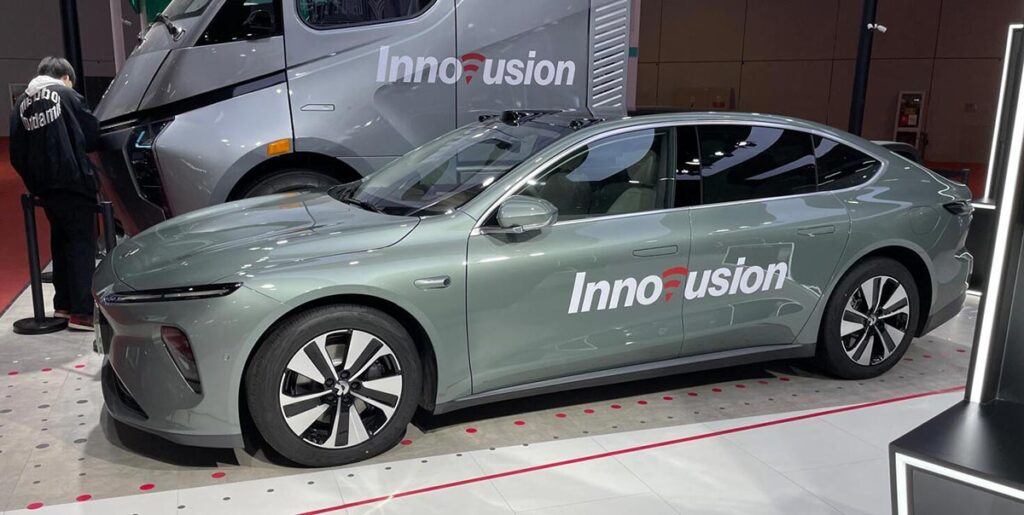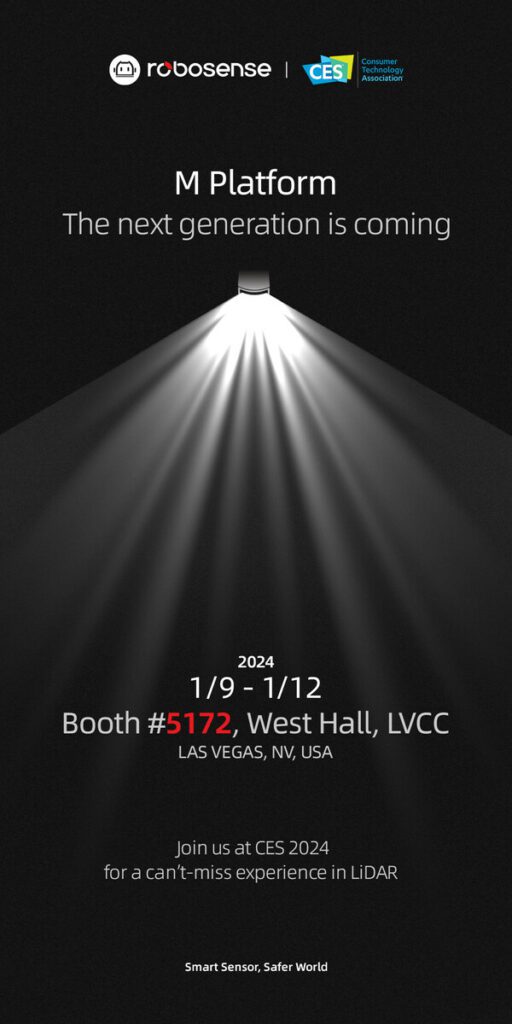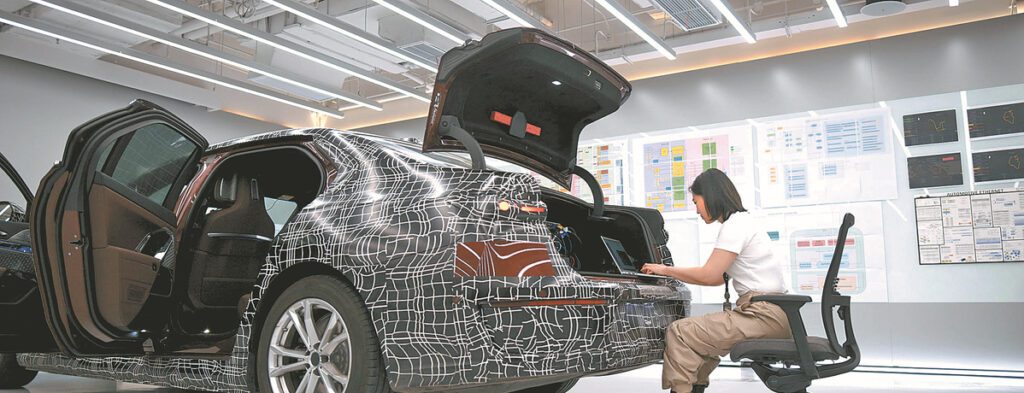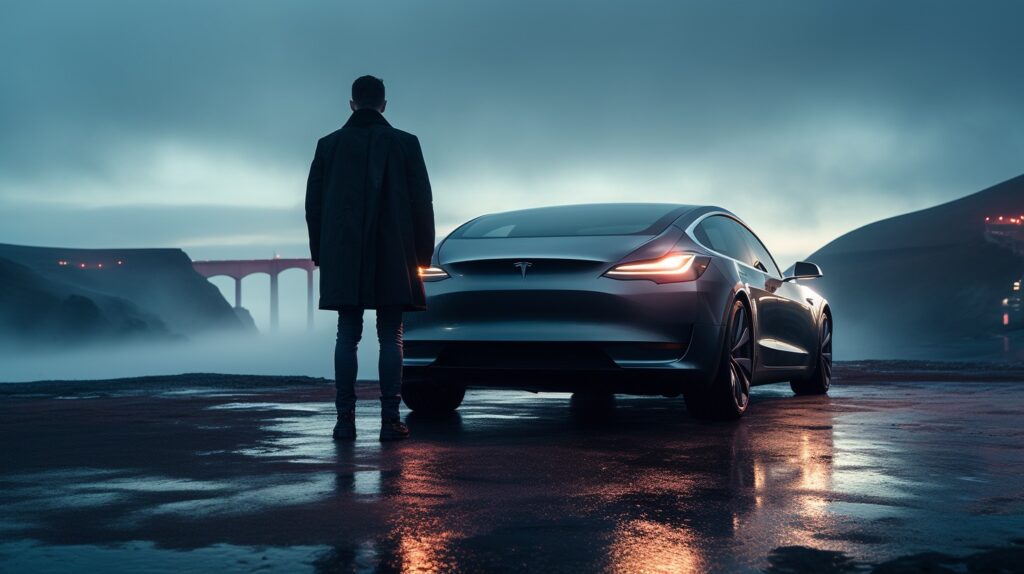
Vueron Newsletter
No. 73
2023.12.19
| Breaking boundaries: Innovusion evolves into Seyond | ||
| RoboSense to Unveil Next-Generation LiDAR Innovations at CES 2024 | ||
| BMW to test L3 vehicles in Shanghai | ||
| Nissan Opens Research Center in China to Drive Smart Mobility and Autonomous Driving Technology |
1. Breaking boundaries: Innovusion evolves into Seyond
-
- Innovusion has undergone a significant transformation and rebranding, emerging as Seyond.
- Originally a startup seven years ago, Innovusion has become a global leader in LiDAR technology, boasting notable sales, substantial revenue, and cutting-edge innovations.
- The decision to rebrand as Seyond is purposeful, reflecting the company’s evolved identity and vision extending beyond the ordinary.
- The name Seyond is a fusion of “See” and “Beyond,” reflecting the essence of LiDAR technology in seeing beyond the ordinary and providing precise perspectives.
- The new logo was meticulously chosen to convey different aspects of Seyond’s identity. The elongated ‘S’ symbolizes the technology’s ability to ‘see beyond,’ while an eye in the logo emphasizes intelligent sight. The lines of the ‘S’ reflect Seyond’s scan pattern, and the 3D curves symbolize the LiDAR technology’s nature.
- Seyond’s core mission is to “Bring the power of intelligent vision to everyone and everything.” The bright teal against dark slate in the logo signifies how Seyond’s LiDAR enables vision in dark environments.
- Seyond aims to continue breaking boundaries in LiDAR technology, inspiring a future where intelligent vision is accessible to every aspect of life, contributing to the development of smart cities and self-driving cars.

Seyond’s rebranding represents a strategic move to align its identity with its evolved mission and vision, emphasizing innovation and the transformative capabilities of LiDAR technology. The thoughtful design of the logo reflects a nuanced understanding of the company’s identity, mission, and the technological aspects of LiDAR, contributing to a cohesive brand narrative.
2. RoboSense to Unveil Next-Generation LiDAR Innovations at CES 2024
-
- RoboSense, a leading LiDAR technology innovator, is set to unveil its latest M Platform line of sensors.
- The new sensors include cutting-edge solid-state LiDAR, such as the M1, the world’s first automotive-grade solid-state LiDAR sensor in mass production, catering to level 3 autonomous driving demands globally.
- Additionally, the E1, developed with RoboSense’s proprietary chip technology, enhances blind spot detection for improved navigation and safety in vehicles and robots.
- Mechanical LiDAR innovations include the Ruby Plus, a 128-beam sensor designed for level 4 autonomous vehicle commercial operations, the BPearl featuring an ultra-wide field for precise short-range blind spot detection, and the versatile Helios series with 16- and 32-beam lidar sensors customizable for various applications, including robotics and intelligent vehicles.
- RoboSense also offers advanced software solutions like HyperVison, a full-stack system combining sensors and software for comprehensive data analytics, aiding critical decision-making.
- Partner demonstrations, including live showcases by Unitree and BOWE featuring their latest robotic technologies, as well as the participation of partners like AMD and TIER IV, highlight the role of RoboSense solutions in broader technological ecosystems.

The focus on solid-state LiDAR and mechanical LiDAR innovations indicates a comprehensive approach to addressing different autonomy levels and applications, from advanced driver assistance to level 4 autonomous vehicle operations. The presence of various partners and live demonstrations suggests that RoboSense’s solutions play a crucial role in broader technological ecosystems, with collaborations in robotics and integration with partners’ systems.
3. Aeva to Showcase World’s First Automotive-Grade FMCW 4D LiDAR for Advanced Driver Assist and Autonomy in Production Vehicles at CES 2024
-
- Aeva will showcase its world’s first automotive-grade FMCW 4D LiDAR for advanced driving automation in mass-production vehicles at CES 2024.
- Aeva will demonstrate its commercially available Aeries II 4D LiDAR technology for automotive applications, highlighting its ability to simultaneously detect 3D position and velocity.
- Aeva will showcase May Mobility’s next-generation autonomous transit vehicle equipped with Aeva 4D LiDAR technology, emphasizing its role in expanding operational design domains for autonomous transit.
- Also, Aeva will offer ride-along demo drives showcasing the unique benefits of its technology, including simultaneous velocity and range detection, Aeva Ultra Resolution™, and immunity to interference.
- Aeva will demonstrate its LiDAR-on-Chip technology tuned for micron-precise measurements, suitable for contactless automated quality control in high-volume manufacturing environments.

Aeva’s focus on showcasing the world’s first automotive-grade FMCW 4D LiDAR emphasizes its commitment to advancing sensing and perception systems for mass-production vehicles, contributing to the development of safer advanced driver assistance systems and autonomous driving at highway speeds. The ride-along demo drives offer a hands-on experience, allowing attendees to witness the unique benefits of Aeva’s technology in real-world scenarios, highlighting features like simultaneous velocity and range detection, Aeva Ultra Resolution™, and interference immunity.
4. BMW to test L3 vehicles in Shanghai
-
-
BMW Group has obtained a test license for vehicles with level 3 autonomous driving functions on designated areas of highways in Shanghai, making it the first automaker to comply with United Nations regulations on the Automated Lane Keeping System in China.
-
This license expansion allows BMW to test advanced autonomous driving technologies in Shanghai, building on a 2018 license that permitted tests on 5.6 kilometers of public roads in the city.
-
The BMW L3 autonomous driving suite incorporates high-performance sensors, including new lidar systems and 8-megapixel front-facing cameras, enhancing safety and object detection capabilities at a distance.
-
BMW is prepared to launch products with level 3 self-driving functions by Chinese regulations, with the new BMW 5 Series Long Wheelbase, launching in January, having the capability to expand to level 3 autonomous driving.
-
In September, BMW received certification for level 3 autonomous driving from the German Federal Motor Transport Authority, with deliveries of vehicles equipped with this feature scheduled for the spring in Germany.
-
Chinese cities like Beijing, Shanghai, and Guangzhou are authorized to issue driverless vehicle test licenses, aligning with China’s efforts to accelerate the adoption of autonomous driving technologies. In December, China issued safety guidelines for the use of autonomous vehicles in public transport.
-
Baidu and Pony.ai, Chinese tech giants, obtained licenses to operate fully driverless robotaxi services in Beijing in March, indicating the country’s growing emphasis on autonomous vehicle technologies.
-

BMW’s acquisition of a test license for level 3 autonomous driving in Shanghai underscores the company’s commitment to advancing autonomous vehicle technologies and expanding its presence in the world’s largest auto market. Compliance with United Nations regulations and collaboration with Chinese authorities positions BMW as a pioneer in navigating the regulatory landscape for autonomous driving in China.
5. Nissan Opens Research Center in China to Drive Smart Mobility and Autonomous Driving Technology
-
- Nissan has opened a state-of-the-art research center in China to accelerate advancements in smart mobility and autonomous driving technology.
- The research center strengthens Nissan’s partnership with Tsinghua University, a top Chinese academic institution, and builds upon collaborative research projects initiated since 2016.
- Despite a decline in Nissan’s sales in China over the past year, accounting for just over one-fifth of global sales, the move reflects Nissan’s commitment to regaining market share and reinforcing its position as a global automotive leader.
- The research center in China aims to leverage the country’s talent pool and technological expertise, serving as a hub for collaborative research and development between Nissan and Tsinghua University.
- The initiative aligns with Nissan’s strategic vision to lead transformative technologies, enhance road safety, and offer cutting-edge solutions, positioning the company at the forefront of innovation in smart mobility and autonomous driving.

Nissan’s commitment to opening a research center in China signifies the company’s strategic emphasis on smart mobility and autonomous driving technologies, recognizing the importance of the Chinese market in driving innovation. Leveraging China’s talent and technological expertise positions Nissan to tap into a rich pool of resources for developing cutting-edge solutions, providing the company with a competitive edge in the global automotive market.
*Contents above are the opinion of ChatGPT, not an individual nor company

